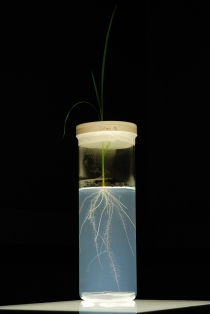COVER STORY
(Page 5 of 6)Identifying genes
At Cornell, McCouch works closely with plant physiologist and professor Leon Kochian, director of the USDA Agricultural Research Service's Robert W. Holley Center for Agriculture and Health at Cornell, to develop aluminum- and drought-tolerant rice and to identify and understand the genes that are responsible for these traits.
In order to identify genes of interest, McCouch and Kochian evaluate single nucleotide polymorphisms (SNPs), points in the genome where there is a base pair change that makes one individual within the same species different from another. "SNPs are like genetic signposts that we use to figure out where a gene conferring a valuable trait resides along a chromosome and to track genes of interest in crosses between wild plants and cultivated ones," McCouch says.

Bioengineering graduate student Randy Clark devised a system to image the root growth in rice plant seedlings and compare it to each plant's genetic fingerprint. See larger image
SNPs are identified by comparing the genome sequences of diverse individuals with a reference genome – the first completely sequenced rice genome from the Japanese sushi cultivar, Nipponbare. Through a $1 million USDA grant, McCouch's group and Cornell-partner Affymetrix Co. recently developed a 1 million-SNP genotyping chip that allows researchers to rapidly and efficiently analyze variations in thousands of individual rice plants and then analyze the data. Now a breeder can make a cross between two genetically different parents, evaluate the genetic composition of the offspring using the SNP chip and determine which genes of interest are in particular offspring. The result, after only three or four generations, is a new plant that contains a desired trait from one starting parent, but also looks and behaves in important ways like the other starting parent.
Cornell also has the advantages of equipment, computing power and expertise to process vast amounts of genetic data on campus. The genotyping – identifying the makeup and locations of SNP variation and genes – is done at Cornell, with the help of Peter Schweitzer, director of the Genomics Facility in the Cornell University Life Sciences Core Laboratories Center. The raw data is provided by researchers in the McCouch lab from purified lines of rice they have grown.
Eventually, terabytes of phenotypic and genotypic data will be analyzed in collaboration with computational biologist Jason Mezey, an assistant professor with an appointment in biological statistics and computational biology at Cornell in Ithaca and in genetic medicine at Weill Cornell Medical College in New York City. Mezey develops algorithms for answering questions in genomics and collaborates with medical researchers and plant geneticists alike to find the statistical evidence that a phenotype may be correlated with a genetic sequence.
"If you have a characteristic with a complicated genetic basis, such as grain size, there are a number of genes where if you were to alter their sequence in the right way, you would be able to alter grain size," Mezey says. "Identifying these genes is challenging."
"So this is the kind of thing we are developing bit by bit. Science is picking away, asking, 'what does this SNP do?' and 'what does that SNP do?'" says McCouch. Eventually, a picture develops that shows how certain SNPs correlate with traits of importance in the world of rice breeding, such as resistance to blast fungi or tolerance to aluminum or drought.
<<View entire story as one page>>